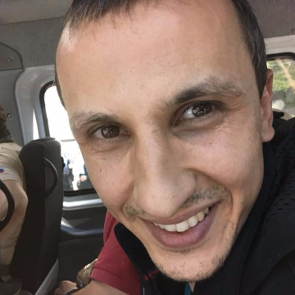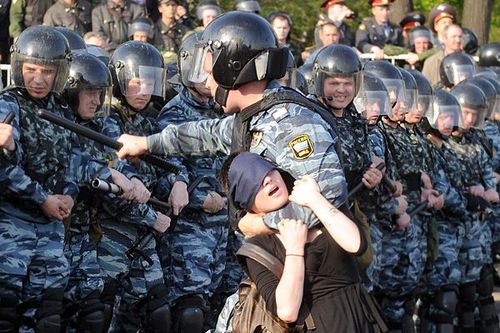
Server Mustafayev
Coordinator of the grass-roots movement Crimean Solidarity, Server Mustafayev is a Crimean Tatar human rights defender. The Crimean Solidarity movement was created following the annexation of the Crimean peninsula by the Russia Federation in 2014. It seeks to support victims of political and religious persecution by monitoring and documenting human rights violations, providing legal aid, observing trials and providing assistance to families. It focuses mainly on providing support to the Crimean Tatar community, which has been particularly targeted by the Russian authorities. Additionally, in the absence of a free media and given the ongoing persecution of dissenting voices in Crimea, it also seeks to raise awareness about human rights violations.
On 21 May 2018, masked policemen entered Server Mustafayev’s home in the city of Bakhchisarai, central Crimea. Following a 3-hour search, a number of documents and electronic equipment were seized and the human rights defender was arrested and brought to the Federal Security Department for interrogation. His lawyer was denied access to observe the search. At a closed hearing the following day, Kievsky District Court ordered that the human rights defender remain in pre-trial detention on charges of “membership of a terrorist organisation” under Part 2 of Article 205.5.2 of the Penal Code of the Russian Federation. He is accused of being a member of Hizb ut-Tahrir, an Islamist movement that is designated as a terrorist group in Russia since 2003, but operates legally in Ukraine and many other European states. Alleged membership of Hizb ut-Tahrir has been used by the Russian authorities in Crimea as a pretext for the prosecution of dissenting voices, including human rights defender Emir-Usein Kuku.
On 20 February 2019, Server Mustafayev was also charged with "conspiring to seize state power by violent means" under Article 278 of the Russian Criminal Code.
Examination of the merits of the case began on 26 August 2019 and it took the court more than a year to reach a verdict. Over the course of the trial, there were numerous violations of Server Mustafayev’s right to defence and breaches of procedural rules such as refusal to consider petitions, refusal to consider recusation of the judges and prosecutors, refusal to question witnesses, denial of adequate space to respond to the accusations and the removal of the human right defender from the courtroom for alleged breach of order1. In addition, on 3 March 2020, in the midst of the Covid-19 pandemic, Server Mustafayev fell ill during the court hearing but the court denied his repeated requests for medical attention. The authorities continued taking him to subsequent court hearings and denying him access to medical care despite suffering from high fever and developing symptoms related to a viral respiratory infection.
On 16 September 2020, the Southern District Military Court in Rostov-on-Don found Server Mustafayev guilty on charges of “membership of a terrorist organisation” and "conspiring to seize power by violent means". The human rights defender was sentenced to fourteen years in a strict-regime correctional colony and a subsequent year of restrictions on his rights and freedoms, including a ban on travel outside of Crimea and an obligation to periodically report to the police. Together with Server Mustafayev, six other men, all of them members of the Crimean Solidarity movement, were sentenced to between 13 years and 19 years in a strict-regime correctional colony and a year of restrictions on their rights and freedoms on terrorist related charges.
The charges against Server Mustafayev and the other Crimean Solidarity members are based on secret audio recordings of their attendance of three meetings in Bakhchisaray mosque in November and December 2016 and January 2017, and on the testimony of a secret witness, later identified as Uzbek citizen, Salohiddin Narzullaev. In the recorded discussions Hizb ut-Tahrir is never mentioned, nor any references to violent or terrorist activities.
The human rights defender was initially held in appalling conditions in the detention centre SIZO-1 in the Russian city of Rostov-on-Don that Amnesty International allege “amounted to inhuman and degrading treatment”. Following a number of pre-trial detention extensions, he was transferred to the detention centre SIZO-5 in Rostov-on-Don. Since 17 December 2020 Server Mustafayev has been held in the detention centre SIZO-3 in Novocherkassk, Rostov oblast. The human rights defender’s health has deteriorated considerably during his stay in detention: he suffers from deteriorating eyesight and considerable dental problems. In late 2020, he wrote an appeal to the Ombudsman’s office requesting medical treatment. Almost a year later, on 2 November 2021, he received a response from the Department of the organisation of medical and sanitary provision of the Federal Penitentiary Service informing him that he was to be treated the month prior to receiving the notification letter, in October 2021, by the ophthalmologist and the dentist.
Detention conditions in strict-regime correctional colony SIZO-3 are notoriously poor; access to running water is sporadic; the cells are damp, with mould on the walls and poor ventilation; and inmates complain of ticks and rodents.
On 29 September 2021, Server Mustafayev’s lawyer filed a complaint to the Prosecutor’s Office of the Rostov oblast and the Federal Penitentiary Service for the Rostov oblast about the improper detention conditions.
On 25 October 2021, a search was carried out of Server Mustafayev’s cell in detention centre SIZO-3. The human rights defender’s medicine, containers for food, Koran, prayer rug, toothpaste and toothbrush, and face razor were all confiscated.
Server Mustafayev’s lawyers have confirmed that their communication with their client is severely restricted. Their requests for phone calls and visits are regularly rejected and their letters to their client are regularly opened before delivery despite being clearly marked as confidential lawyer-to-client communications.
In addition, the persecution of Sever Mustafayev has extended to his mother, Venera Mustafayeva. On 15 September 2020, she staged a one-person picket in Bakhchisaray against the criminalisation of her son. The following week, two administrative cases were opened against her. She is accused of “violation of the rules for holding a mass public event” and “violation of the quarantine rules prohibiting the holding of mass public events” – despite undertaking the demonstration alone. Venera Mustafayeva was found guilty in one of these cases and issued a fine.
Server Mustafayev and the other defendants in this case strongly deny the terrorism related charges and claim that they were prosecuted for political and religious reasons.
Amnesty International and Russian human rights organisation Memorial recognise Server Mustafayev as a prisoner of conscience.
On 11 August 2020, when the judge refused to question a number of witnesses, Server Mustafayev silently raised his hand to contest the decision. The judge unexpectedly announced that the defender was to be removed from the trial until the end of the judicial investigation; “Due to the numerous violations of the rules of the trial by the defendant [Server] Mustafayev, and the ineffectiveness of the measures taken by the court to enforce order in the trial, the presiding judge must intervene to remove the defendant [Server] Mustafayev until the end of the trial”.


